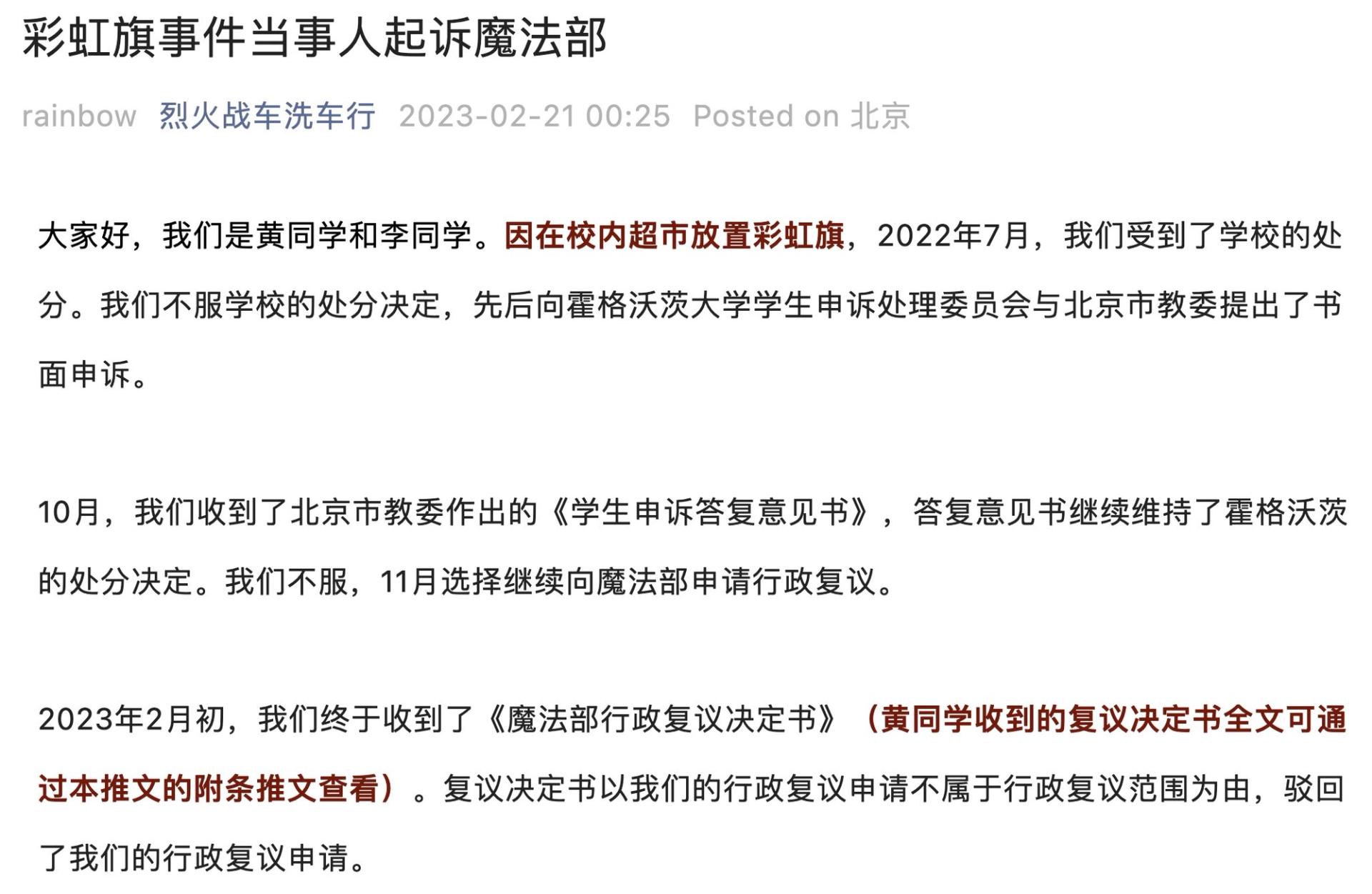The News
Two students who were reprimanded last year for handing out LGBTQ flags at Beijing’s Tsinghua University are now suing China’s Ministry of Education for refusing to listen to their appeal over their punishment, according to a now-censored WeChat post that the students appeared to publish on Tuesday.

The students, who only identified themselves as Huang and Li, said that while their disciplinary action has technically expired due to school regulations, they were committed to pursuing the lawsuit because “it’s still a fact that [they] were penalized for flying rainbow flags.”
Huang told the South China Morning Post that the lawsuit is more symbolic in nature.
“We feel a bit pessimistic about getting a win in the ruling … [but] the lawsuit still has its significance in raising public awareness,” she said.
In this article:
Know More
Despite online censorship of LGBTQ content in China, the two students appeared to temporarily circumvent it in their WeChat post by referring to Tsinghua as “Hogwarts” and the Ministry of Education as the “Ministry of Magic,” in references to the Harry Potter series.
The duo also posted a photo of them outside a Beijing courthouse, masking their faces with animal memes.

Searches for references to their lawsuit on WeChat and Weibo came up empty on Wednesday.
Last June, the two students left 10 small rainbow flags at Tsinghua’s bookstore with a note encouraging students to celebrate pride. University officials subsequently issued formal reprimands against the pair, accusing them of causing “a negative impact” on campus culture by distributing unauthorized, promotional materials.
According to Bloomberg, the punishment meant that the two students would be ineligible for scholarships or awards for six months.
The students appealed the disciplinary action, first directly with the university, and then with the Beijing Municipal Education Commission, which upheld the university’s punishment in October.
The students finally appealed to the Ministry of Education which informed the two students in early February that they would not intervene because the issue was outside the scope of their administrative duties.
Step Back
While LGBTQ student groups in China have grown in popularity since the early 2000s, the government in recent years has been cracking down on these associations. Students have reported instances of university officials barring or restricting activist groups from hosting and publicizing LGBTQ events.
In one of the most notable incidents of censorship in 2021, WeChat deleted dozens of LGBTQ student organization accounts for allegedly ”[violating] regulations on the management of accounts offering public information service on the Chinese internet.”
China removed homosexuality from its official lists of mental illnesses in 2001, and for a while, legal issues surrounding LGBTQ rights did gain some traction and media coverage. However, under President Xi Jinping, conversations around LGBTQ rights have significantly diminished.
Expert View
Darius Longarino, a law researcher at Yale University who previously managed legal reform programs promoting LGBTQ rights in China, told Semafor that he believes the central government in recent years has begun targeting LGBTQ communities more than other human rights movements.
For instance, China banned “sissy men” from TV in 2021 and last year, the country’s revised national standards warned that exposure to sexual orientations is “harmful to youth.”
“There’s this idea that LGBT issues — because it’s a global issue and it relates to communities outside of China — that somehow LGBT activists are like a Trojan horse,” Longarino said. There’s a perception that they’re “pawns of the West,” he added.
Longarino believes that the students’ case is unlikely to gain any traction in the local media. He said it was incredibly bold of them to pursue such a contentious case against the government, given the crackdown on zero-COVID protesters, many of whom were students and advocates of feminism and gender politics.
“There’s much less space for advocacy for the media to cover this,” he said. “And the security apparatus is much more active in terms of shutting stuff down really quickly, even tiny things.”
Notable
- Contemporary Chinese politics mirrors much of the same “Don’t Say Gay” rhetoric seen in the United States, LGBTQ activist Zhijun Hu wrote in The Diplomat in December. His essay explores how Chinese nationalists see homosexuality as a threat to society, and recounts witnessing how some in China echo the anti-LGBTQ rhetoric in the U.S. that perceives being gay or trans as a “lifestyle.”